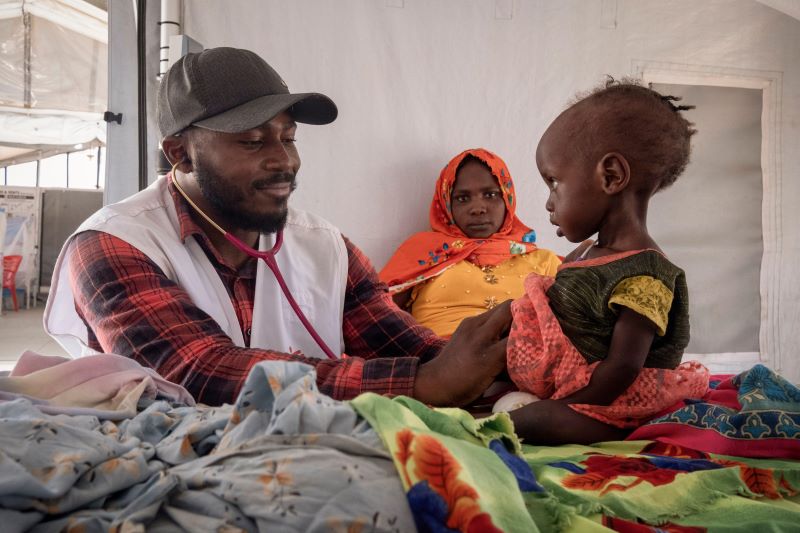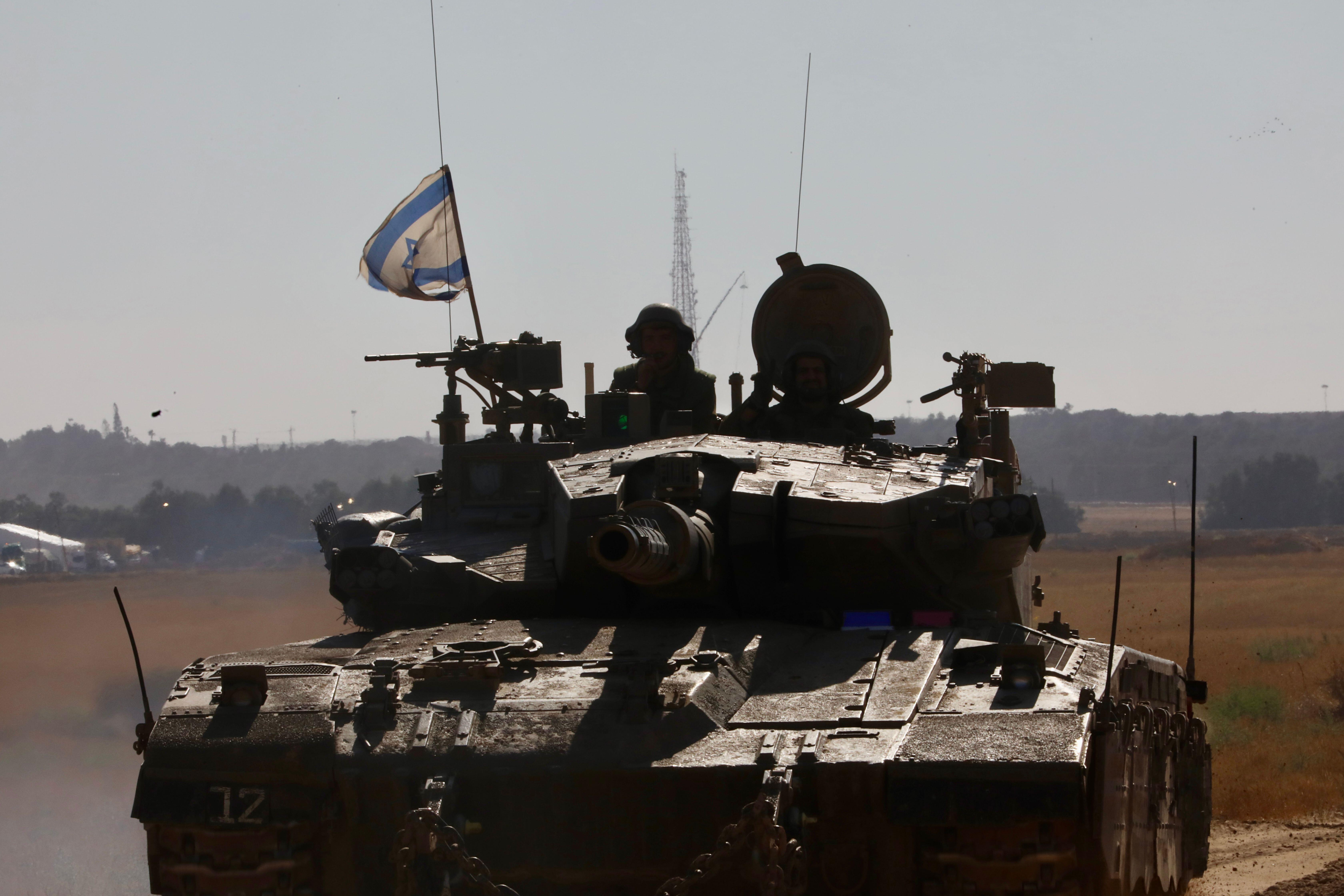Catholics from the Holy Family parish in Gaza visited the neighbouring Orthodox Church of St Porphyrius on Sunday “to exchange Easter greetings and share hopes for peace”.
Hundreds of people have been sheltering in both churches since October. An airstrike killed 17 people at St Porphyrius in the early weeks of the conflict, an incident described as a “war crime” in a legal submission to the International Criminal Court last week.
The Chicago-based advocacy group Justice For All said the IDF strike was “not just an attack on a building but an assault on the spiritual and cultural heritage of the Palestinian Christian community”.
“If this church had been anywhere else in the world, there would have been a global uproar. It’s imperative that the international community stands firm in protecting the places of worship of minorities, ensuring these sanctuaries are preserved amidst conflict,” said the group’s president, Imam Abdul Malik Mujahid.
In southern Gaza, the Israel Defence Forces (IDF) began “a precise counterterrorism operation to eliminate Hamas terrorists within specific areas of eastern Rafah” on Monday. Hamas had accepted a ceasefire proposal put forward by mediators from Egypt and Qatar, but the Israeli government said this did not meet its “core demands”.
UN Secretary General António Guterres asked both combatants “to go the extra mile needed to make an agreement come true and stop the present suffering”, as the IDF prepared its offensive.
“A ground invasion in Rafah would be intolerable because of its devastating humanitarian consequences and because of its destabilising impact in the region,” he said.
Cafod and Christian Aid called on the UK government to oppose the Rafah offensive and to suspend arms sales to Israel. “The UK has a responsibility to prevent civilians being killed and injured,” said Cafod in a statement. “Allowing the export of weaponry and military technology is contributing to the suffering.”
Christian Aid’s partners providing aid in Gaza were reporting that “temporary shelters in Khan Yunis have been destroyed and panic has set in as people contemplate evacuation”.
Aid agencies said the IDF’s control of the Rafah border crossing between Gaza and Egypt threatened emergency supplies for the territory.
The Latin Patriarch of Jerusalem gave two lectures last week on the role of religious leaders in wartime. Speaking at the College of Europe in Warsaw on 30 April, Cardinal Pierbattista Pizzaballa said: “In the Holy Land today, peace seems a distant dream, overshadowed by the horrors of conflict and it's time to seek reconciliation, healing, and hope.”
Two days later, the patriarch delivered a lecture at the Pontifical Lateran University in Rome on “Characteristics and Criteria for a Pastoral Care of Peace”.
Cardinal Pizzaballa said religious leaders must work to promote both “a new culture of legality” as well as to “become a living and prophetic voice of justice, human rights, and peace”.
He continued: “We cannot remain silent in the face of injustices or invite people to live peacefully and disengage,” adding that “the preferential option for the poor and the weak, however, does not make us a political party”.
The conflict is not just a concern for the local Church, he said, but affects the universal Church. He described the “pluri-religious” and “pluri-cultural” nature of the Holy Land and urged fellow religious leaders to “create contexts in which communities can express themselves”. He called for “continuous dialogue” so that “a serious pastoral care in peace is born and developed”.
Speaking after taking possession of his titular church in Rome last week, Cardinal Pizzaballa reflected on his offer in October last year to offer himself in exchange for the hostages taken by Hamas on 7 October.
“As pastor of my community I have to do all that is possible to save my people, and to stop this nonsense war,” he said to reporters outside the Church of St Onuphrius.
In the US, the Bishop of Lexington John Stowe OFM Conv joined a peace demonstration outside the White House on 3 May alongside a number of Catholic religious, calling for a permanent ceasefire in Gaza and urging US government to stop supplying Israel with weapons.
Bishop Stowe, who is president of Pax Christi USA, told the demonstrators: “It's a requirement of our faith that we are called to be peacemakers, not by some movement of the moment, but by the Lord Jesus Himself.”
He continued: “When food cannot get in, when medical help is limited or inaccessible to the people in Gaza, when innocents are being killed day in and day out, when people are trapped and being forced into even smaller confinement – we have to raise the voice, a voice that is not supportive of Hamas or terrorism, but a voice that calls for peace.”
The vigil expressed solidarity with students who have been protesting on campuses across the US, including several Catholic universities such as Notre Dame and Georgetown.
Bishop Stowe was one of more than 200 Catholic leaders who signed an open letter to President Joe Biden last week, calling for “a ceasefire in Gaza, the release of hostages and an end to the shipment of weapons to Israel”. Other signatories included the Bishop of San Diego Cardinal Robert McElroy, and the Archbishop of Santa Fe John Wester.
In Canada, a Catholic bishop walked a route the length of the Gaza Strip in support of victims of the conflict and to “make a strong statement that the atrocities, damage, and indignities that are being done must end”.
Bishop Bart van Roijen of Corner Brook and Labrador in Newfoundland walked 26 miles on 29 April, ending his journey with a prayer service at the Cathedral of the Holy Redeemer in Corner Brook.
Jordan’s King Abdullah II assured Pope Francis that Christian and Islamic holy sites in Jerusalem would be protected during the war. The king had an audience with the Pope at the Vatican on 2 May.
Jordan “will continue undertaking its religious and historical role in safeguarding holy sites in Jerusalem, under the Hashemite Custodianship,” King Abdullah said, though he expressed concern about “continued Israeli violations of holy sites in Jerusalem”.
Both Pope Francis and King Abdullah have repeatedly called for a ceasefire and a two-state solution to the Israeli-Palestinian conflict.
An Arab Christian neuroscientist appointed to head an Israeli university last month said her election to the role was “a message for the Christian minority [in Israel] that we are rooted here, that we can succeed here”.
Prof Mouna Maroun, a Maronite Christian, was elected rector of the University of Haifa – located on Mount Carmel – on 11 April, the first woman, Christian or Arab to hold the post.
“I have always believed that the emancipation of the Arab minority in Israel is through higher education,” she told CNA.



 Loading ...
Loading ...